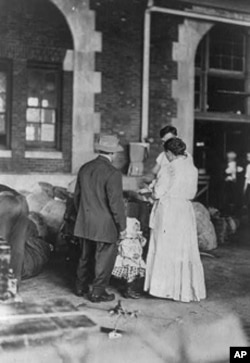Sam Roberts is a New York Times reporter. But he's not descended from a long line of Robertses. His immigrant grandfather was Samuel Rabinowitz, who changed his name to Rubin when he came to the United States - then to Roberts years later.
The story is a common one. For more than a century, newcomers took what they considered to be acceptable American names.
Sometimes processing agents at U.S. immigration stations simply mis-translated the names of those who spoke little or no English.
More often, immigrants altered their own names to hide their national origin and ease the discrimination against people with perceived ethnic names.
Newcomers like German master piano maker Heinrich Steinweg found it easier and smarter to do business as Henry Steinway in the United States.
Comedian Jon Stewart was born Jonathan Stuart Liebowitz; actor Martin Sheen was Ramón Estévez; actress Natalie Wood changed her name from Natalia Nikolaevna Zakharenko.
Still others changed names when they realized most Americans could not pronounce long family names full of x's and y's and z's.
But Sam Roberts discovered that the picture is changing dramatically as the United States evolves into an ever-more-multicultural society in which racial and ethnic pride is strong. Americans now seem comfortable with people who have all sorts of names, even tongue-twisters.
But that's not to say that people aren't still changing or hiding some original names.
In the current climate of suspicion of many things Muslim, for instance, some immigrants - or their children - have taken new names to replace the Osama or Muhammad that they were born with.
Still, it's clear that you don't have to be a Brown or a Smith - or a Sam Roberts, for that matter - to sound American any longer.






